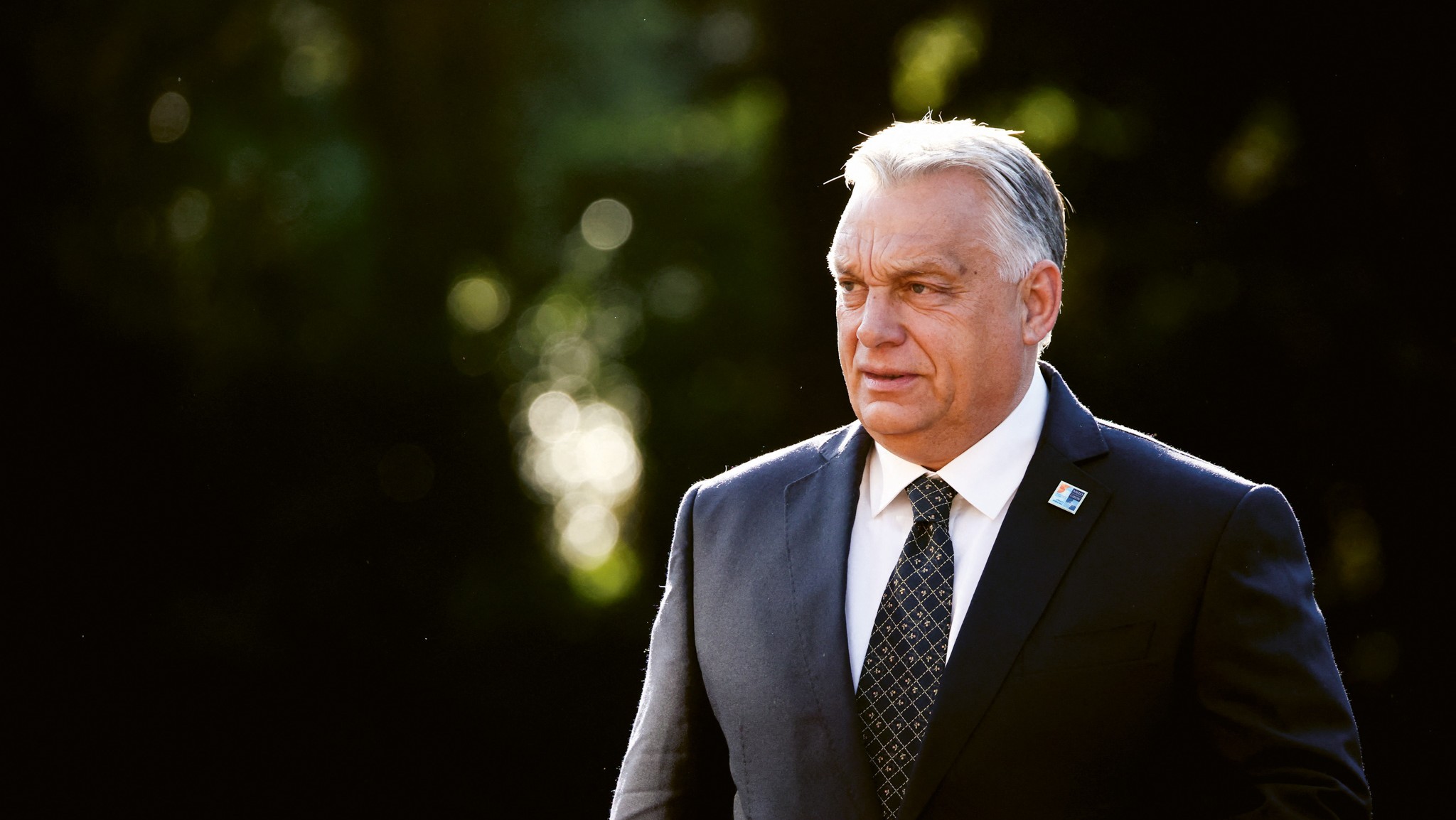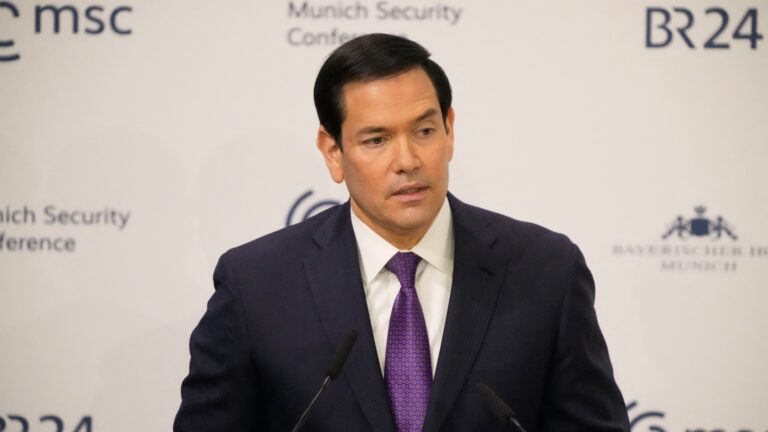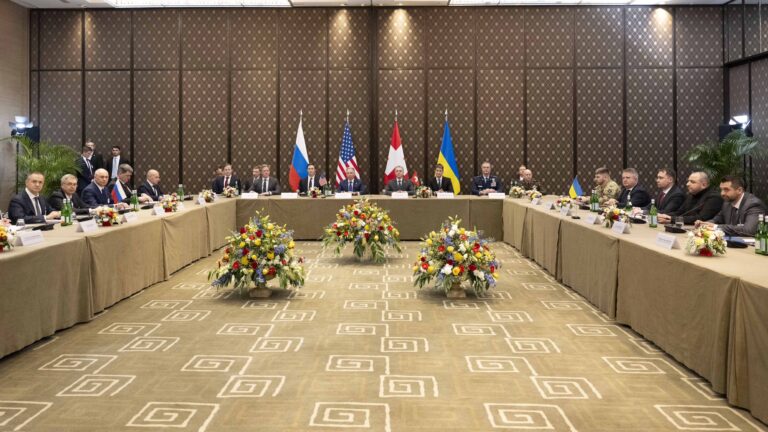This article was originally published in Vol. 5 No. 3 of our print edition.
Reflections on Viktor Orbán’s 2025 Tusványos Address
Seeing Viktor Orbán close out the Tusványos summer camp always feels like being in the presence of a Hungarian chieftain addressing the tribe. For 15 years, he has been Hungary’s prime minister, and love him or hate him, no one can deny that he has made his mark as one of the thousand-year-old nation’s most important leaders. But is his long reign over Hungarian politics coming to an end? His supporters certainly hope not, but Orbán delivered his 2025 Tusványos address under the shadow of the approach of the 2026 elections—his most challenging yet.
The Fidesz turncoat Péter Magyar, who will be the leader of the opposition in spring balloting, is polling well. It is not certain what his Tisza Party stands for, other than not being Orbán. After a decade and a half of Fidesz governance, it is understandable that some Hungarians might be ready for a change. Magyar’s advantage is that he gives Hungarian voters the chance to vote against Orbán without having to vote for the political left.
The prime minister has always been a realist about politics and recognizes that he could lose next year. ‘Democracy means that every election is open: this is both the beauty and the danger of it,’ he said, near the start of his Tusványos address. ‘There are never any guarantees—anyone who wants a guarantee of victory has come to the wrong place. It will be as the people decide.’1
Yet he assured the Fidesz faithful that opinion polls give his party the advantage. Still, the vote will not happen until next April, which is several lifetimes in politics. The 2022 election was expected to be close, but the outbreak of war between Russia and Ukraine, and Orbán’s uncompromising stand against Hungary’s participation in any NATO action on that front, caused voters to rally to his side. Fidesz won in a landslide. That terrible war grinds on, despite everything Orbán warned about from its beginning concerning Russia’s inevitable triumph, having been borne out by events. If April arrives with still no end to the fighting, Hungarian voters will be hard-pressed to risk handing over the reins of government to Magyar, who is far more friendly to the bellicosity of Brussels on Ukraine’s behalf.
Before I arrived at Tusványos, I had been in France, where I met a conservative political activist who is an admirer of Hungary’s prime minister. ‘Fidesz really needs to up its digital campaign,’ said the Frenchman. ‘This is my business, and I know what I see.’
At Tusványos, Orbán announced the founding of pro-Fidesz, conservative ‘digital communities’ to better fight the political battle online. ‘But fighting is not for everyone,’ he added. ‘Some people are fed up with conflict. This is why we need a place, a space, for those who do not want to participate in direct political battles, but want to participate in building the country. We need a space, a support system, political and community protection, and many digital civic circles.’2
Then Orbán turned to the weightiest material in his address: the prospect of world war. His political realism also manifests in the area of geopolitics, which is why his analysis of the Russia–Ukraine War, though directly contradictory to what the hive mind of Brussels and European capitals wished to believe, has been so prescient.
The Hungarian leader did not sugarcoat the news. Despite Donald Trump’s election in the US bringing hope that the Ukraine War might soon draw to a close, the overall signs pointing to global war are increasing. With admirable frankness, the prime minister cited the ‘ominous darkness’ of these facts:
- High levels of fear about an approaching world war among Europeans.
- Intensifying conflict between great power blocs centred around the US, China, and now a resurgent Russia.
- An increased number of localized armed conflicts worldwide.
- The rebuilding of trade barriers between nations.
- An accelerating global arms race.
- Mass migration, which is twice as high today as it was at the close of the Cold War.
Alas for Hungary, said the prime minister, its ability to influence the direction of the Russia–Ukraine War has proven limited. Orbán said Ukraine’s Volodymyr Zelenskyy rejected his advice to make peace with Russia, for Ukraine is in a no-win position. Still, said Orbán, Hungary must continue to try to form a regional bloc for peace with other Central European powers, and must never surrender on its campaign to keep Ukraine out of the EU. If Ukraine joins the EU, he warned, it will ‘bring war with it’.
Whatever happens, Orbán said, Hungary must stay out of any war. ‘It is not enough to declare that we will stay out—we must know how to stay out of it, and that is a skill,’ he said.3 Orbán listed five ‘pillars’ of his neutrality policy.
- Maintaining good relations with major world powers. ‘We are on good terms with the Americans, the Russians, the Chinese, the Indians, and the Turkic world. And we are not on good terms with Brussels.’ Orbán said this is not simply a matter of exchanging diplomatic pleasantries: ‘Instead, what I mean is that everyone, every major power, should have an economic and material interest in Hungary’s success; this means that no one should have an interest in destroying and weakening Hungary.’
- Building up the nation’s capacity for self-defence. ‘The Hungarian Army must gain technological superiority: to defend ourselves, we need a kind of precision army. There is still a lot to do on that.’
- Creating self-sufficiency and crisis resiliency. ‘If one wants to stay out of war, there are four areas in which one needs to be self-sufficient: the military industry, energy, food, and digital capabilities,’ said Orbán. He warned that Hungarians do not take seriously enough the role that artificial intelligence (AI) is starting to play at every level of society. ‘We must do this work at the national level, because in this competition, the European Union is worthless. We will get nowhere if we wait for the EU in order to develop our Hungarian artificial intelligence capabilities within its framework. We must therefore be prepared to enter this competition independently, to become a key regional player, and to work together with other countries in the region.’
- Superiority in human resources. The prime minister boasted that in terms of GDP, ‘Hungary is spending more on education than any other country in Europe—certainly on higher education.’
- Creating a long-term strategic plan for stability. ‘We need to build a complete national consensus around the proposition that we must not lock ourselves into any bloc,’ he said. Yes, Hungary is part of the Western alliance system, but it must also tie itself to the economies of Asia and the East. The goal, he clarified, is to ‘live through the coming decades as a nation, as the Hungarian nation.’4
What a remarkable statement this is! Historians tell us that Grand Prince Géza, the father of the future King István (Stephen I or King Saint Stephen), regarded as the founder of the Hungarian nation state, chose to have his son baptized in or around the year 997 AD by a bishop of the Latin Church, so as to orient Hungary towards the Holy Roman Empire of the West, as opposed to the Christian Byzantine Empire of the East. Géza calculated that Hungary would be stronger and better able to defend itself if it was tied by religion to the West. Now, for the first time in a thousand years, a Hungarian leader is willingly (that is, not with Soviet guns pointing at his head) turning his nation’s face to the East (while remaining friendly with the West), for the same reason that Géza did: to protect Hungary’s national interests.
What is more, the final pillar touches on what so many Westerners fail to understand about the Hungarian mentality. Few people in the West understand how isolated the Hungarian people are as a distinct nation, with a particular language spoken by nobody else, and a shared history. Nor do Westerners grasp the lasting psychological trauma inflicted by the Treaty of Trianon (1920), which forcibly severed two-thirds of the country from a prostrate post-war Hungary.
Along those lines, Western European nations have for decades endured what the French dissident thinker Renaud Camus calls the ‘Great Replacement’.5 Respectable Western opinion demonizes Camus as a bigot and his idea as nothing more than a racist conspiracy theory. But a close reading of the 79-year-old French literary scholar (and lifelong leftist) reveals something far more precise than this vulgar caricature. Camus’s argument is that the literal replacement of native European populations by migrants from outside of Europe could only be happening because European elites prepared the ground by erasing love of Europe’s history and culture among its peoples. They have done this both actively, by teaching younger generations that Western civilization is nothing but a farrago of colonialism and bigotry, and passively, by failing to transmit each nation’s high culture to the masses.
‘Hungary is part of the Western alliance system, but it must also tie itself to the economies of Asia’
European elites love to ‘celebrate diversity’—a high-sounding abstraction that results in the replacement of peoples who no longer believe in themselves by non-European foreigners who are not ashamed of their own cultures. Orbán understands that this is the path of civilizational suicide. He cannot force other European countries to abandon their folly, but he can work to prevent Hungarians from allowing themselves to be replaced by the policies of Brussels. It is said that the Israelis once told Orbán that the one-million-euro fine Hungary pays daily to Brussels for defying its migration policies should be considered an investment in Hungary’s future as a Hungarian state.
As he neared the end of his long discourse, the prime minister got to the heart of his final Tusványos address before next year’s election: ‘The European Union has decided to go to war’ with Russia. Hungary has decided not to go to war. The EU has decided that in order for Hungary to go to war, there must be a pro-Ukrainian and pro-Brussels government in Hungary.’6
In other words, according to Orbán, a vote for Péter Magyar is a vote to sell the country out to Brussels and to go to war. To be fair, Tisza leader Péter Magyar has been extremely cautious about his Ukraine policy. He has followed the government line on Hungarian non-participation in the war, but has done so from a generally pro-EU position. At Tusványos, Orbán speculated that Tisza has a secret deal with the EU Commission: if Prime Minister Magyar drops opposition to Hungary’s involvement with the Ukraine War, and agrees to annul Hungary’s current restrictive migration laws, and the law protecting children and minors from LGBTQ propaganda, then Brussels will release the billions of euros it owes Hungary. Magyar will no doubt deny this, but at least Hungarians now know the battle lines for the spring election. Voters tempted to vote for Tisza to get rid of Orbán without voting for the left will be taking a big risk.
After the speech, a Fidesz supporter told me it is notable that the prime minister did not address the strongest complaints voters have about his government, according to polls: the perception of widespread corruption, as well as the underfunding of hospitals and schools. One can only guess as to why Orbán said nothing about these matters. One plausible answer can be found in the speech’s conclusion. And it is this: the prime minister sees Hungary embroiled in a David-vs-Goliath fight for its own existence as a nation. If so, then that is a cause that dwarfs any other concern of domestic politics.
In the final minutes of his talk, Orbán explained how the EU bureaucracy in Brussels has used every crisis as an opportunity to take power away from EU nation-states and centralize it in Brussels. Hungary was defeated and dismembered by the Allies after the First World War; this, said Orbán, will not happen again. Hungary will not allow its fate to be decided by others. Western Europe, he said, has already made a fateful choice by admitting millions of migrants. As a result, ‘the countries to the west of us have irreversibly transformed into mixed societies—with growing Muslim populations. Within the foreseeable future, large cities will become Muslim-majority areas, and the population in large cities will change. Europe will remain a destination for migration.’ The tsunami expected to come from sub-Saharan Africa has not yet begun, he noted, but Western Europe has no defence against it. Orbán shockingly said that in a decade, ‘one of the most important tasks of the prime minister, the government majority and the country will be to protect our western borders from migration—not just the southern borders, but the western ones too!’7
Orbán saved the most important point of his entire address for the end—a point that showed his great strength as a historical and geopolitical thinker. Why has Western Europe been unable to defend itself? Because they have abandoned Christianity. ‘We do not know how, but if you lose Christianity, sooner or later, you will somehow lose your national existence as well. This realization is not part of their national system of instincts,’ Orbán said. It remains so in Hungary, where Christianity is established in the Constitution. But this is not assured forever. Orbán pointed to the historical fact that European nations have passed through a time when the faith was living, into a time when its peoples live under ‘cultural Christianity’—that is, the old habits of thought formed during the centuries of vivid religion. This is where the nations of Central Europe are today, he said.8
‘Why has Western Europe been unable to defend itself? Because they have abandoned Christianity’
Western Europe, by contrast, has cast aside its Christian inheritance for ‘zero Christianity’—and has therefore opened the door to its own conquest by migrant peoples who bring with them an alien faith that, however mistakenly, they believe in. You cannot fight something—Islam—with nothing. As Grand Prince Géza chose in the tenth century to tie Hungary solidly to the Christian West for the sake of strengthening the nation, so now does his 21st-century successor opt to loosen ties to the post-Christian West, for the same cause.
Orbán identified the legalization of same-sex marriage as the Rubicon that Western Europe crossed, sealing its fate. Why? Because same-sex marriage ‘rejects the basic principles of Christian coexistence’. He did not elaborate on this point, but he might have quoted the prophetic American sociologist and social critic Philip Rieff (1922–2006). Though a secular Jew, Rieff predicted in his 1966 masterpiece The Triumph of the Therapeutic,9 that Western civilization would unravel because of the Sexual Revolution—a civilizational catastrophe that could only happen, he said, because the West had ceased to believe in the authority of its Judeo-Christian heritage.
Rieff held that sexual discipline—which held together the traditional family—was near the centre of the Christian social model. The Sexual Revolution, which was in full swing when Rieff made this observation, was made possible by the decline of Christianity and accelerated the obliteration of what remained of it. He called the Sexual Revolution the most important revolution of our time, because it marked the collapse of the source of the West’s social order, and its replacement by a libertine culture based on personal pleasure and individual autonomy.10
Viktor Orbán might never have read Rieff, but he understands his perspective well. The prime minister, perhaps the most significant politician Hungary has produced in centuries, ended on a melancholy note, one that implicitly recognized the limits of his authority. As he once said, politicians can give people things—laws, subsidies, and suchlike—but they cannot give people meaning. That depends on meaning-giving institutions, most of all families, churches, and synagogues. If those institutions abandon their roles, then any progress made by politics will evaporate.
Here were Orbán’s final words to the Hungarian tribe gathered in the valley at Tusványos: ‘I do not know the answers to the questions of whether they can sink any lower, whether we can stand our ground where we are, or whether we can climb back into the world of living faith. But I do know that it is up to us, the young people, the children we have raised. Have we taught them that if they are Hungarian, they have a duty? That duty is to preserve what we have, to acquire what we do not yet have but need, and to reject what we do not need. Now it will be decided what kind of parents we have been.’ 11
In these almost elegiac lines, we see that the prime minister who has led the Hungarian people for 15 years, and who has demonstrated what vigorous political leadership can accomplish, grasps that in the end, it is not up to him, but rather to them, to choose the kind of future Hungary will have—if it is to have one at all.
Sooner or later—perhaps in 2026, but certainly someday—Viktor Orbán will no longer be the Hungarian chieftain. Listening to his parting thoughts at Tusványos, it occurred to me that if the Hungarian people choose to forsake the faith embraced by King Saint Stephen over a millennium ago, upon which he built the Hungarian nation, and instead permit themselves to be dissolved into the post-Christian cultural mongrelization represented by the godless, nationless EU, the tragedy will not be Viktor Orbán’s, but their own.
NOTES
1 ‘Orbán Viktor miniszterelnök beszéde a Bálványosi szabadegyetemen – Tusványos 2025’ (Prime Minister Viktor Orbán’s Speech at the Bálványos Free University—Tusványos 2025), Médiaklikk (26 July 2025), https://mediaklikk.hu/video/2025/07/26/orban-viktor-miniszterelnok-beszede-a-balvanyosi-szabadegyetemen-tusvanyos-2025/.
2 ‘Orbán Viktor miniszterelnök beszéde…’
3 ‘Orbán Viktor miniszterelnök beszéde…’
4 ‘Orbán Viktor miniszterelnök beszéde…’
5 Renaud Camus, The Great Replacement: Introduction to Global Replacism (Éditions du Château, 2024).
6 ‘Orbán Viktor miniszterelnök beszéde…’
7 ‘Orbán Viktor miniszterelnök beszéde…’
8 ‘Orbán Viktor miniszterelnök beszéde…’
9 Philip Reiff, The Triumph of the Therapeutic: Uses of Faith After Freud (Harper and Row, 1966).
10 Reiff, The Triumph of the Therapeutic.
11 ‘Orbán Viktor miniszterelnök beszéde…’
Related articles:







